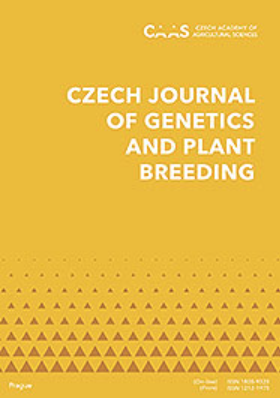Assessment of epigenetic methylation changes in hop (Humulus lupulus) plants obtained by meristem culture
IF 1.8
4区 农林科学
Q3 AGRONOMY
引用次数: 2
Abstract
In vitro meristem cultures have been used for the production of hop (Humulus lupulus L.) virus-free rootstocks worldwide, because multipropagation is considered to preserve the genetic stability of the produced plantlet. Nevertheless, in vitro tissue cultures can cause genetic and epigenetic changes. Therefore, we studied the genetic and epigenetic variability of Saaz Osvald’s clones, Sládek and Premiant cultivars on the DNA methylation level by methylation-sensitive amplification polymorphism (MSAP). In vitro propagated plants, acclimatised glasshouse rootstocks as well as derived mericlones and control plants under field conditions were used for the analyses. A total of 346 clearly and highly reproducible amplified products were detected in the MSAP analyses within the studied hop plants. We found 16 polymorphic products (4.6% of products) and 64 products with methylation changes (18.5% of products) in the analyses. The demethylation events were comparable to the de novo methylation events. Most demethylation changes were found in the in vitro plants, but only a few of them were found in the derived mericlones under field conditions. In contrast, the de novo methylation changes persisted in the acclimatised plants under glasshouse or field conditions. A hierarchical cluster analysis was used for the evaluation of the molecular genetic variability within the individual samples. The dendrogram showed that the individual samples of the same variety, more or less, clustered together. Because the methylation status varied during the virus-free rootstock production process, we suppose that de/methylation process is a natural tool of epigenetics and evolution in vegetatively propagated plants.分生组织培养啤酒花表观遗传甲基化变化的评价
体外分生组织培养已在世界范围内用于生产啤酒花(Humulus lupulus L.)无病毒砧木,因为多重繁殖被认为可以保持所生产植株的遗传稳定性。然而,体外组织培养可引起遗传和表观遗传变化。为此,本研究利用甲基化敏感扩增多态性(methyl- sensitive amplification polymorphism, MSAP)技术研究了Saaz Osvald无性系、Sládek和Premiant品种在DNA甲基化水平上的遗传和表观遗传变异。采用离体繁殖植株、驯化的温室砧木以及田间条件下衍生的分生无性系和对照植株进行分析。在所研究的啤酒花植物的MSAP分析中,共检测到346个清晰且高重复性的扩增产物。我们在分析中发现16个多态性产物(占产物的4.6%)和64个甲基化变化产物(占产物的18.5%)。去甲基化事件与新生甲基化事件相当。大多数去甲基化变化发生在离体植株中,但在田间条件下,在衍生的分生克隆中发现的变化很少。相比之下,在温室或田间条件下,驯化植株的从头甲基化变化持续存在。分级聚类分析用于评估单个样本内的分子遗传变异性。树状图显示,同一品种的单个样品或多或少地聚集在一起。由于脱毒砧木生产过程中甲基化状态的变化,我们认为去甲基化过程是无性繁殖植物表观遗传和进化的自然工具。
本文章由计算机程序翻译,如有差异,请以英文原文为准。
求助全文
约1分钟内获得全文
求助全文
来源期刊

Czech Journal of Genetics and Plant Breeding
Agricultural and Biological Sciences-Plant Science
CiteScore
2.20
自引率
0.00%
发文量
25
审稿时长
>12 weeks
期刊介绍:
Original scientific papers, critical reviews articles and short communications from the field of theoretical and applied plant genetics, plant biotechnology and plant breeding. Papers are published in English.
 求助内容:
求助内容: 应助结果提醒方式:
应助结果提醒方式:


